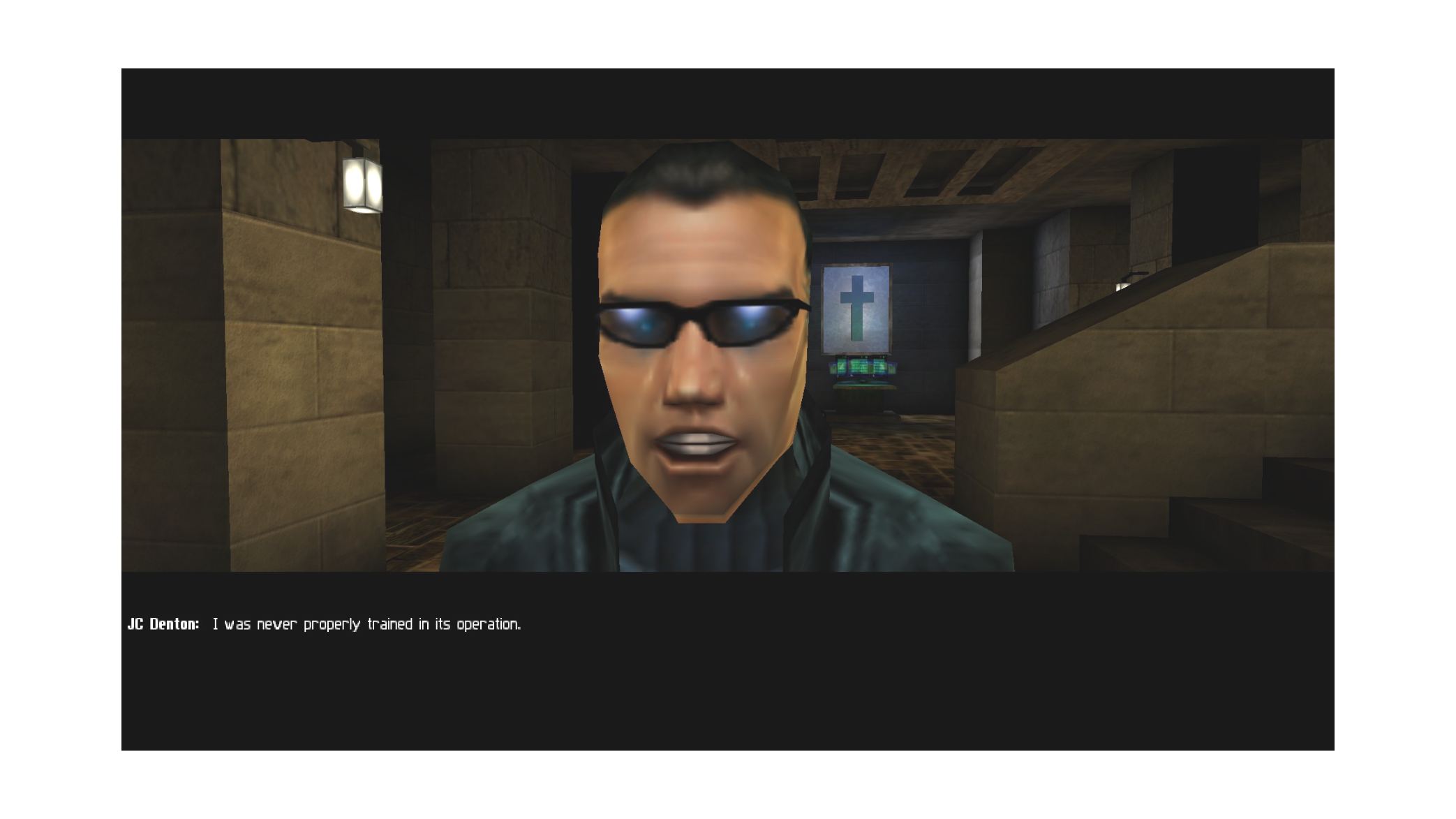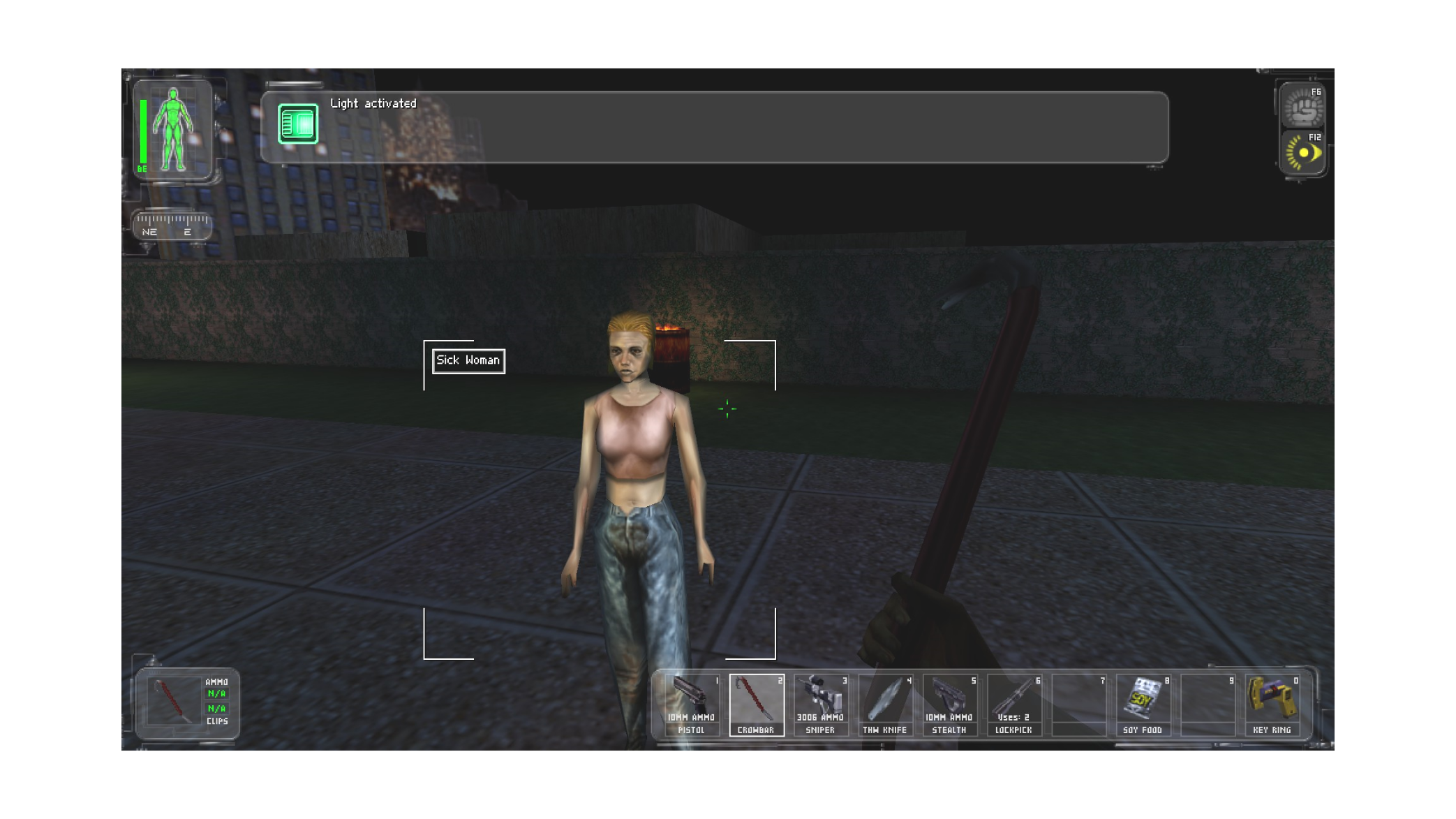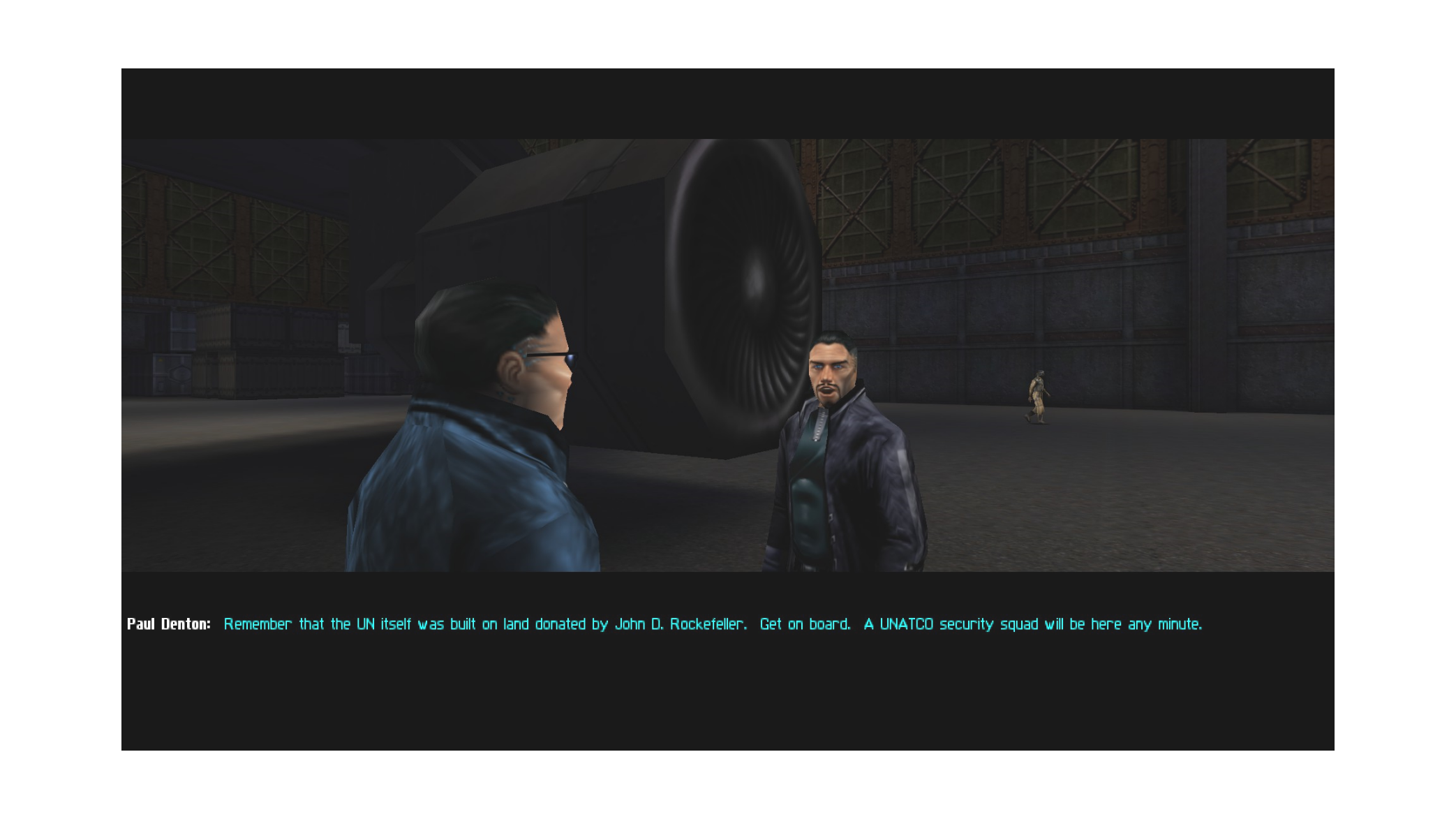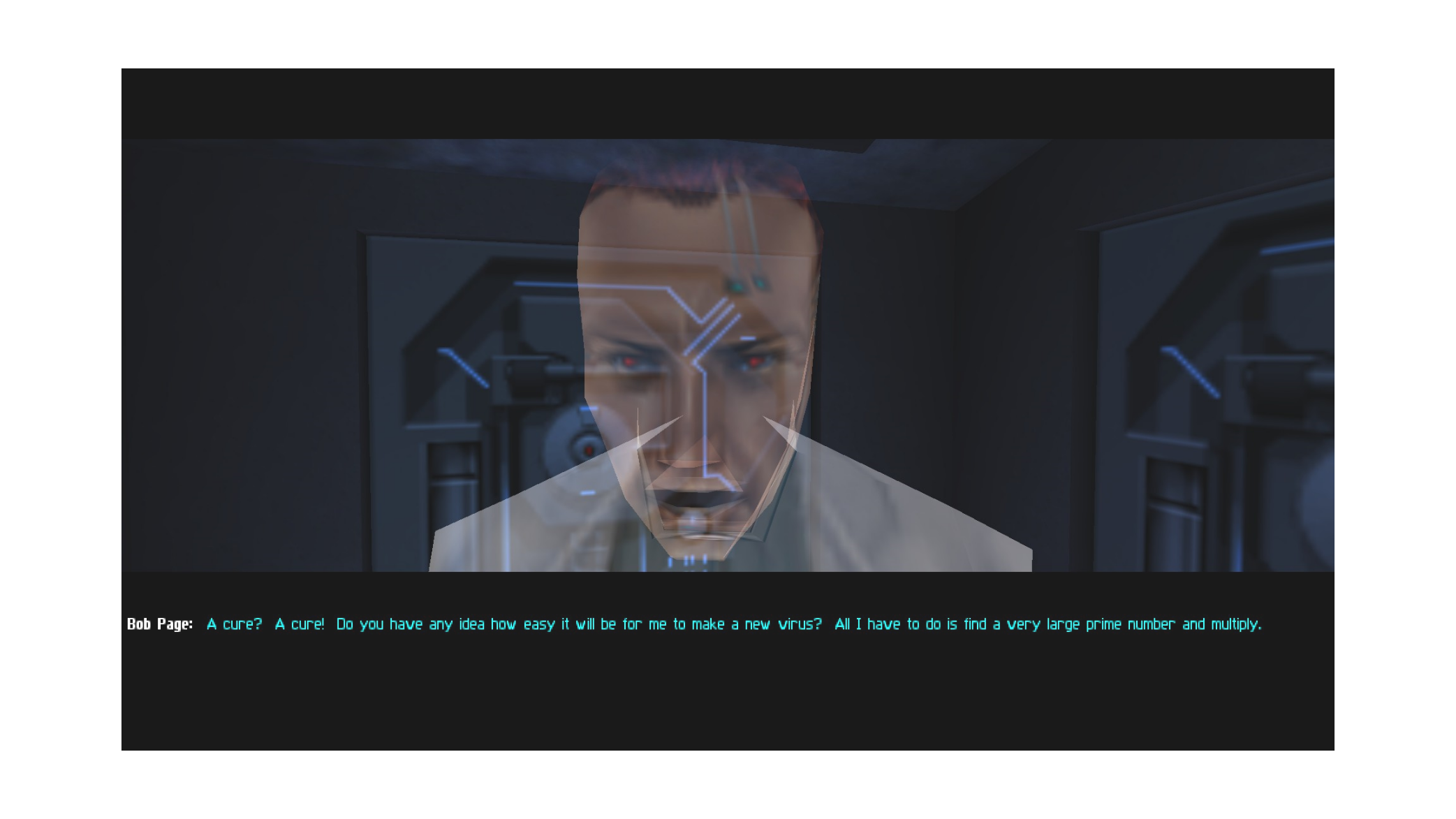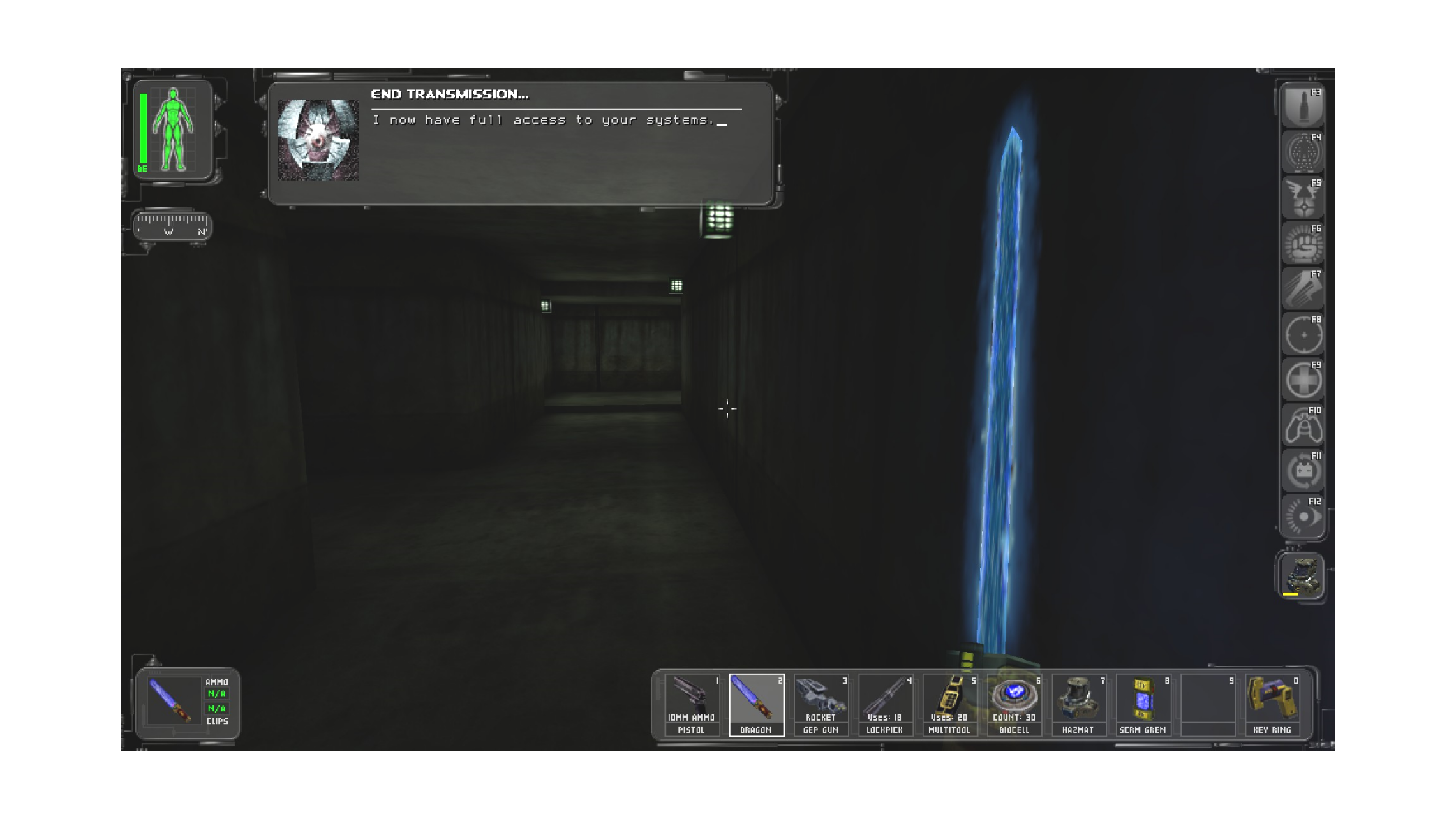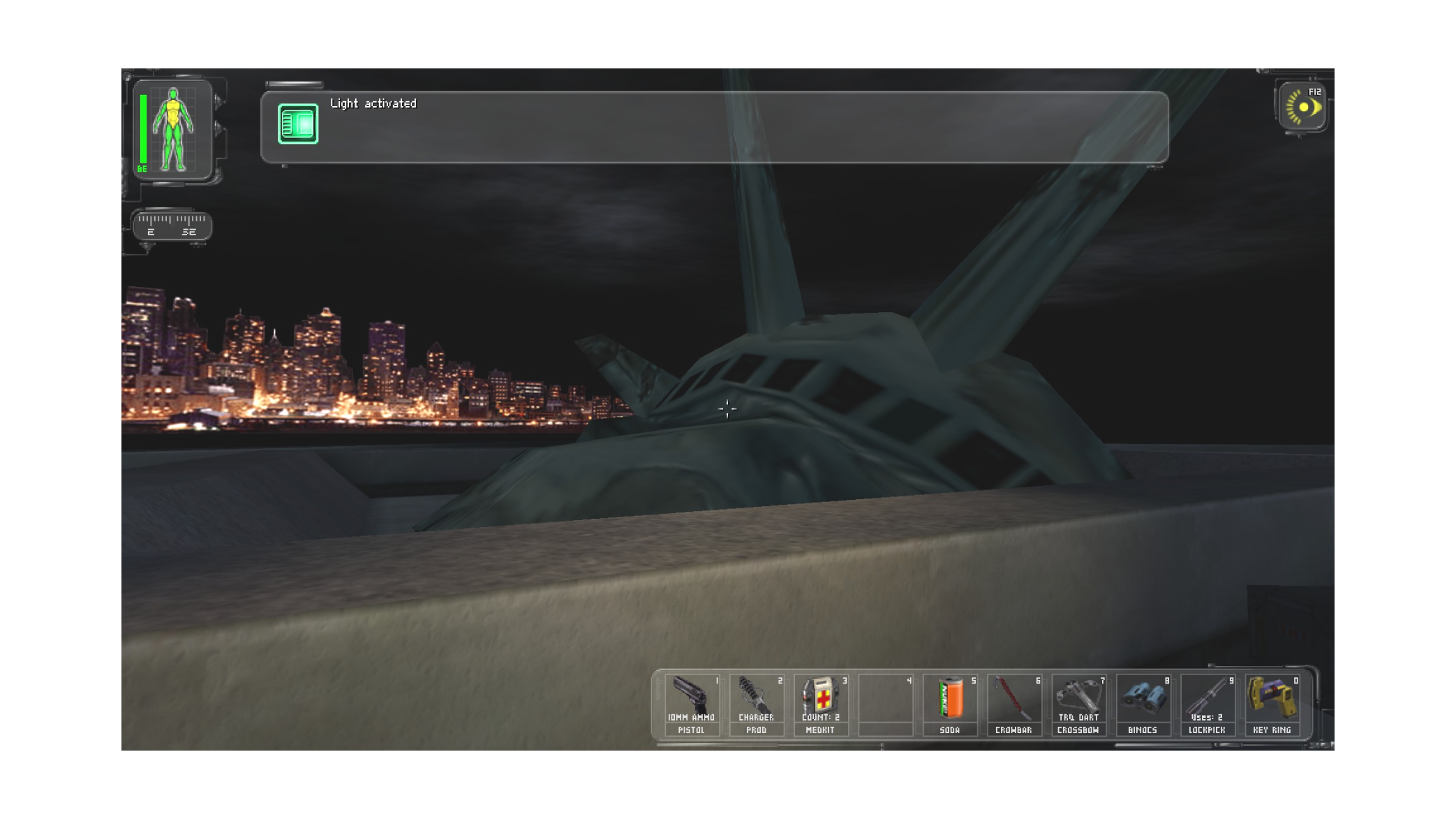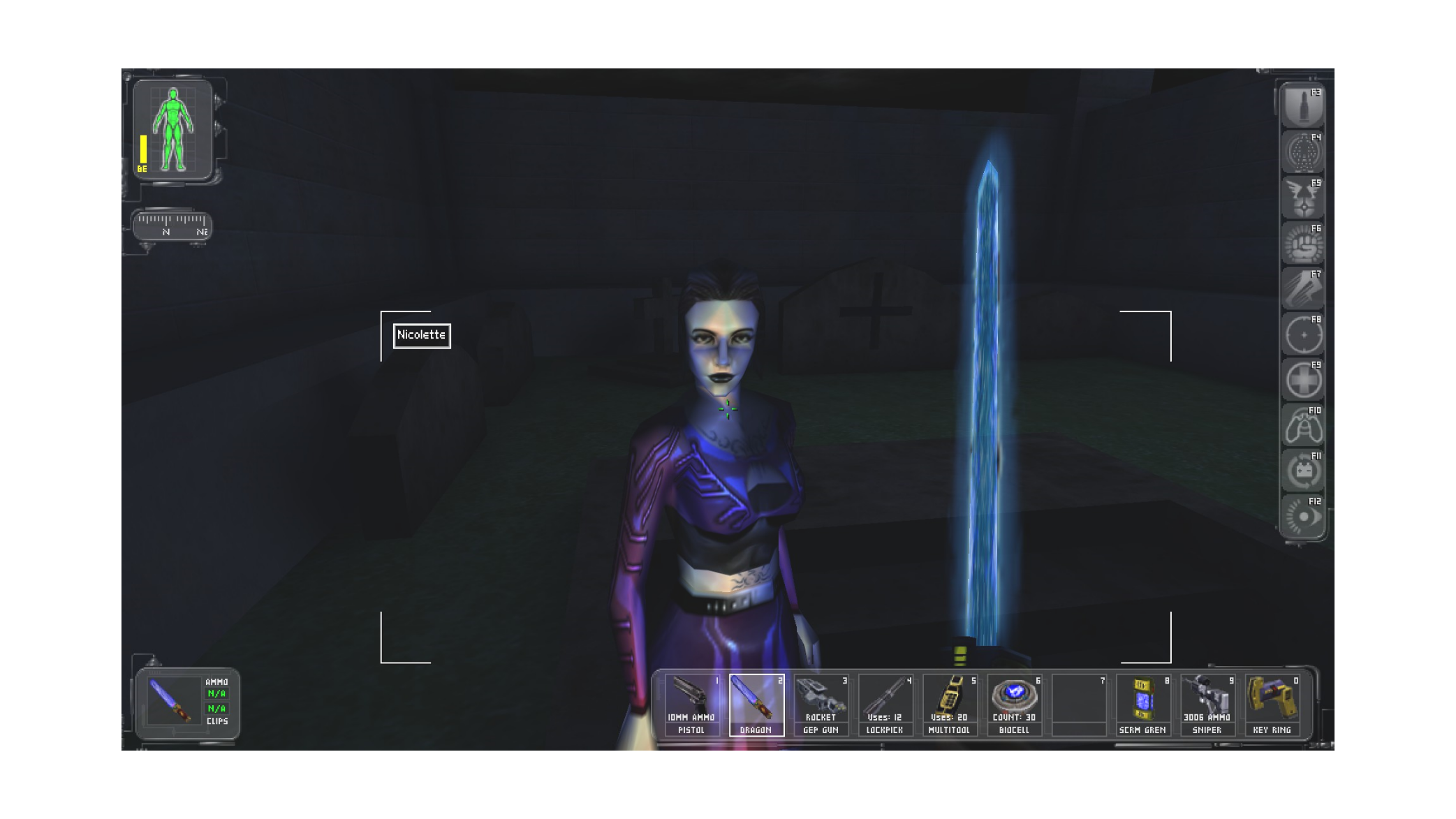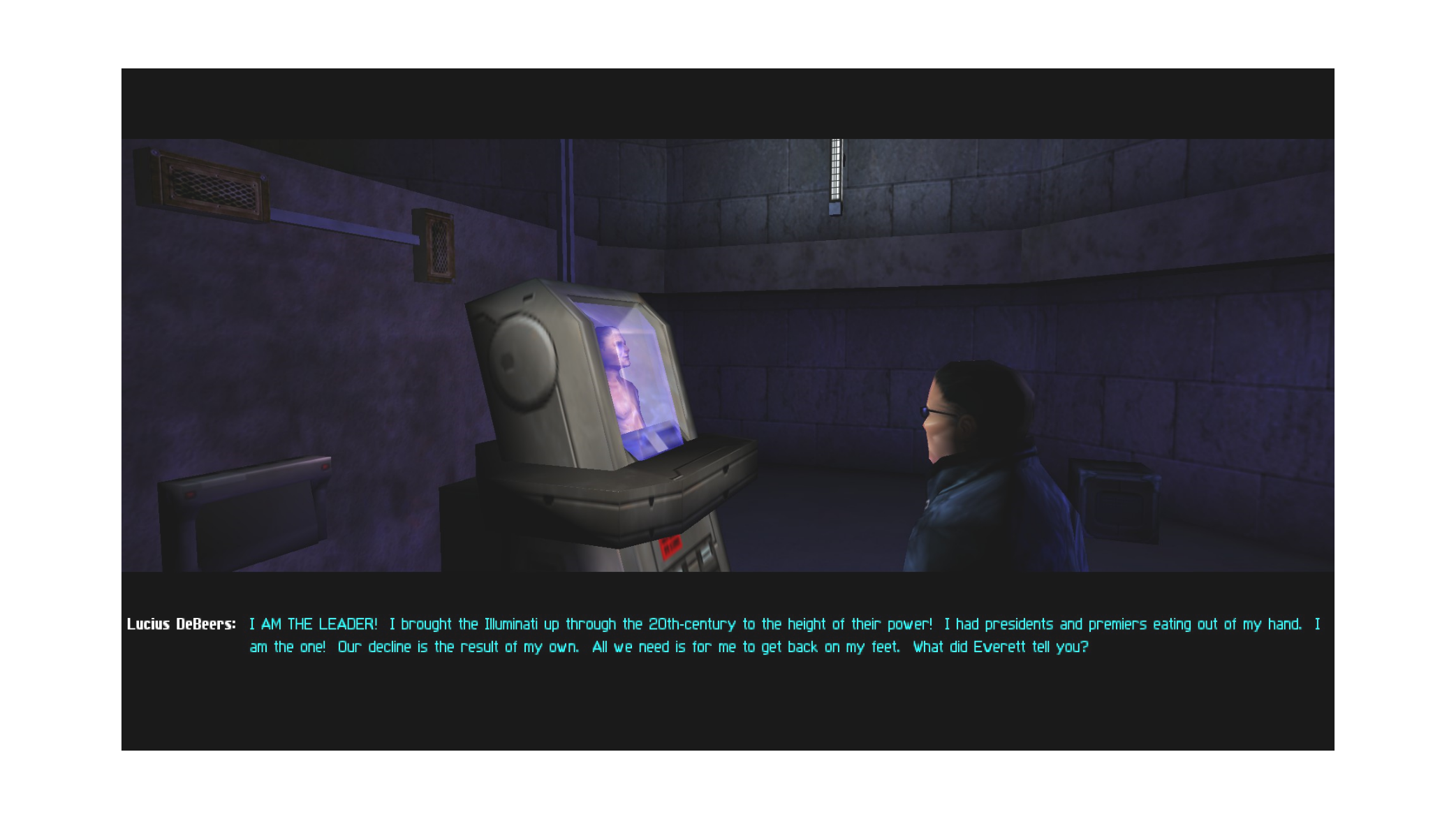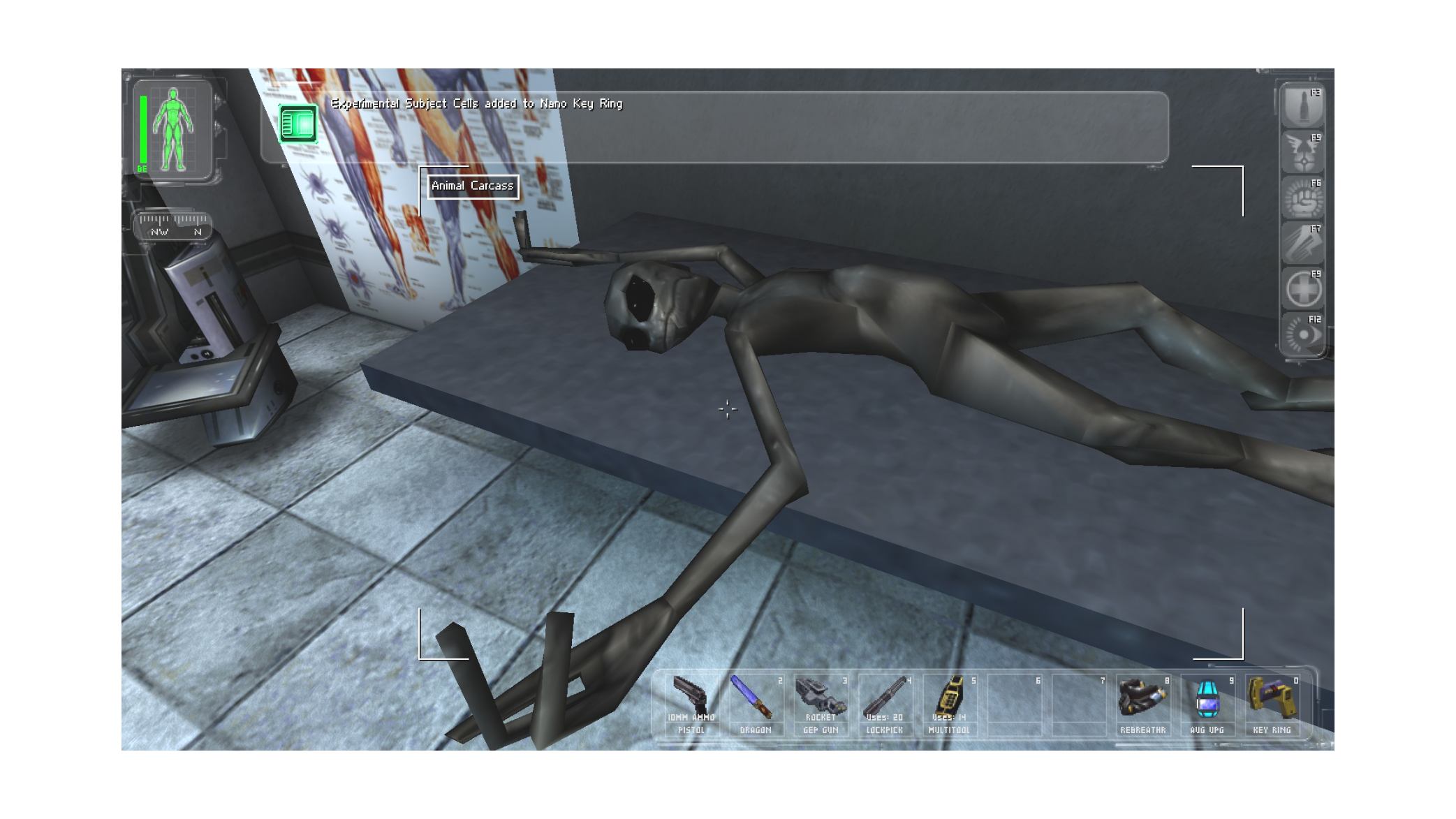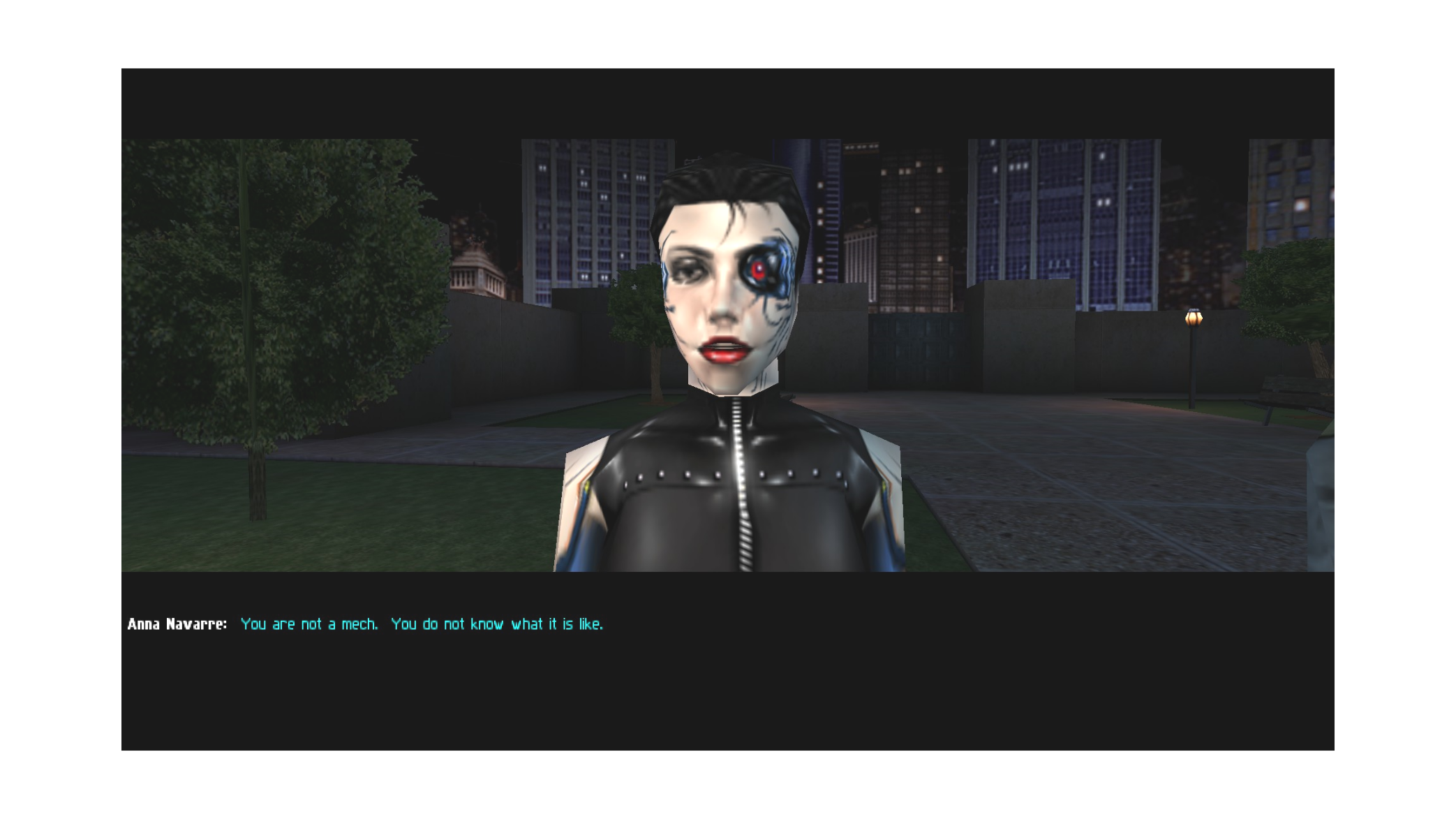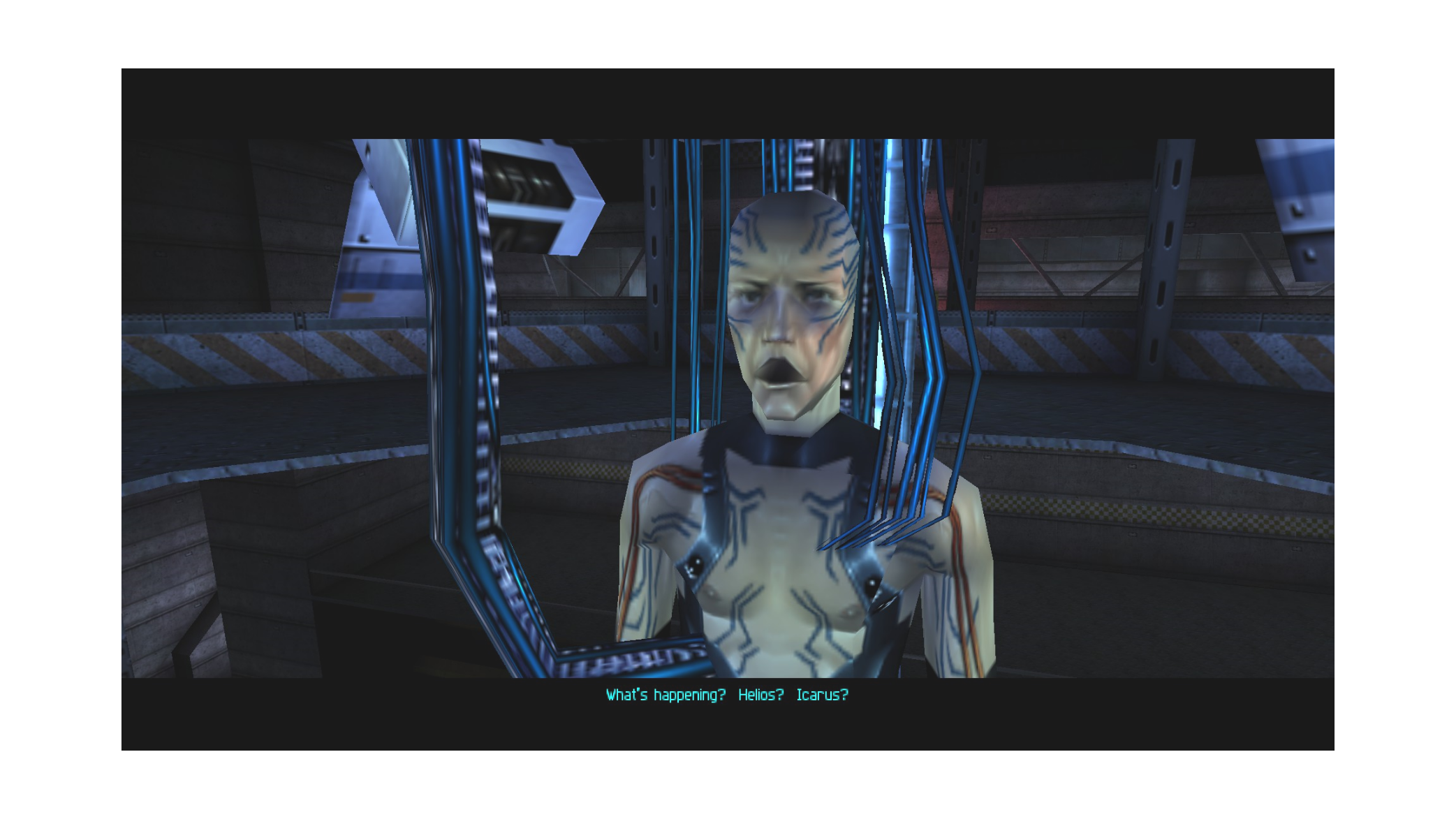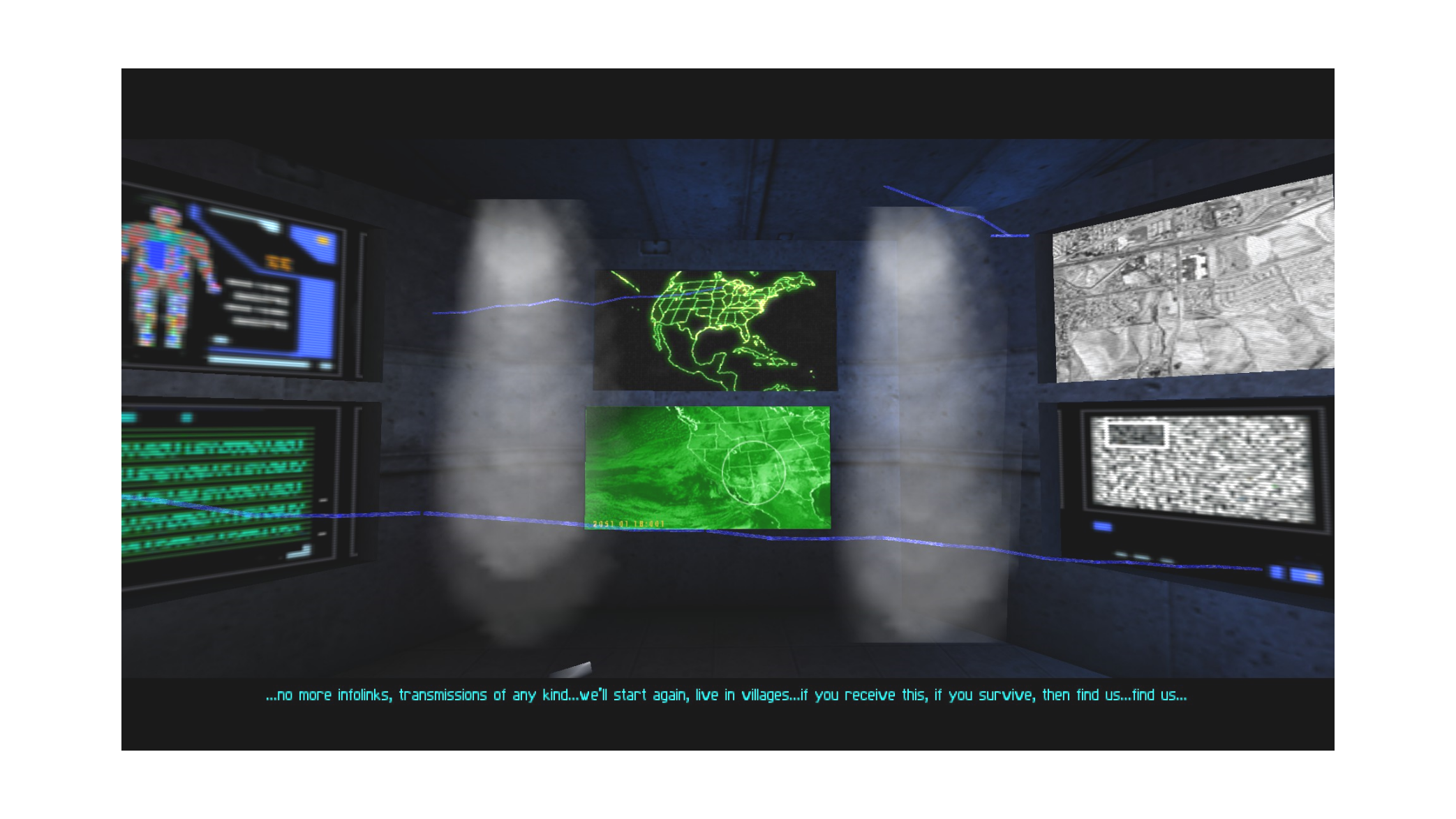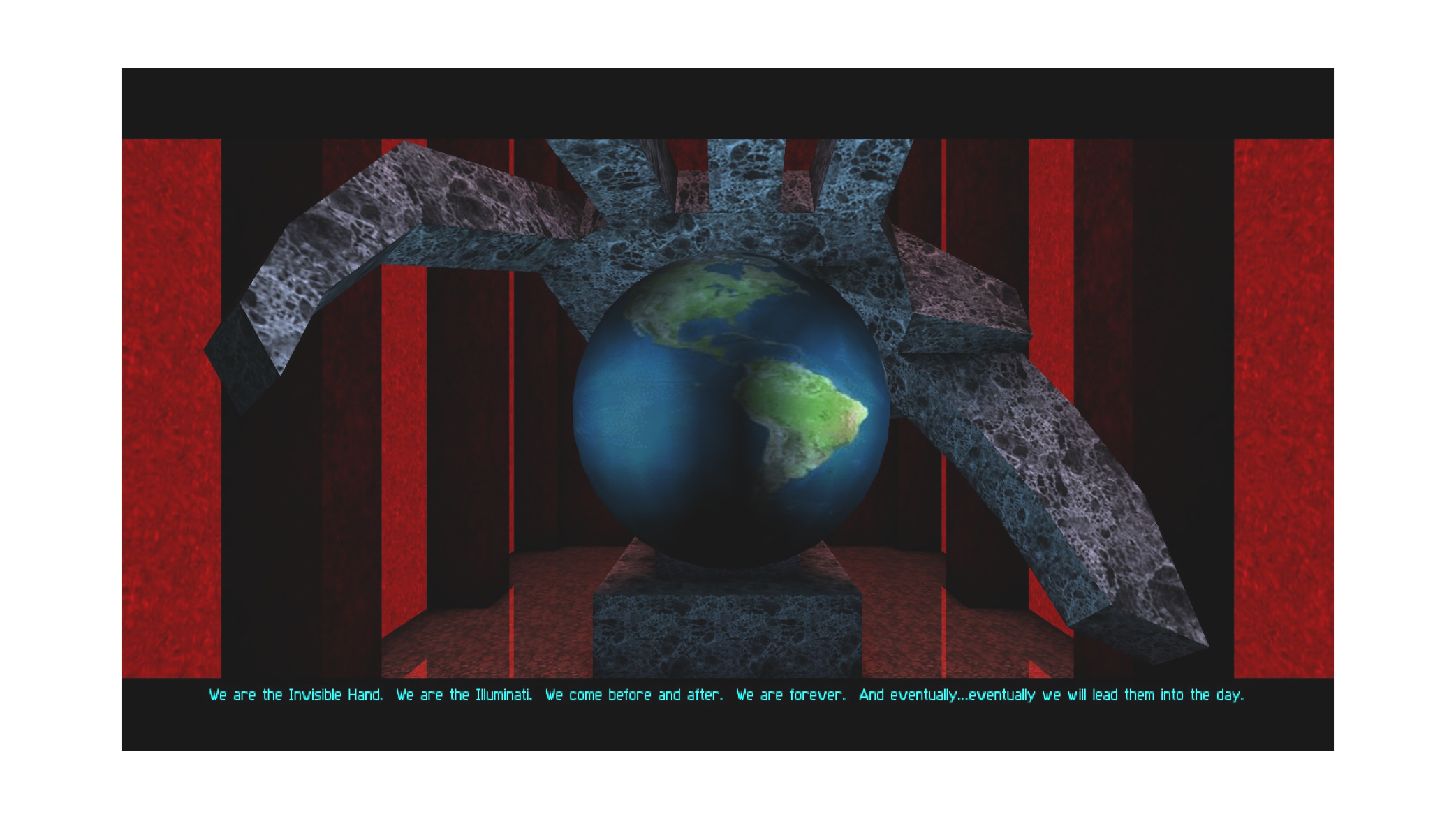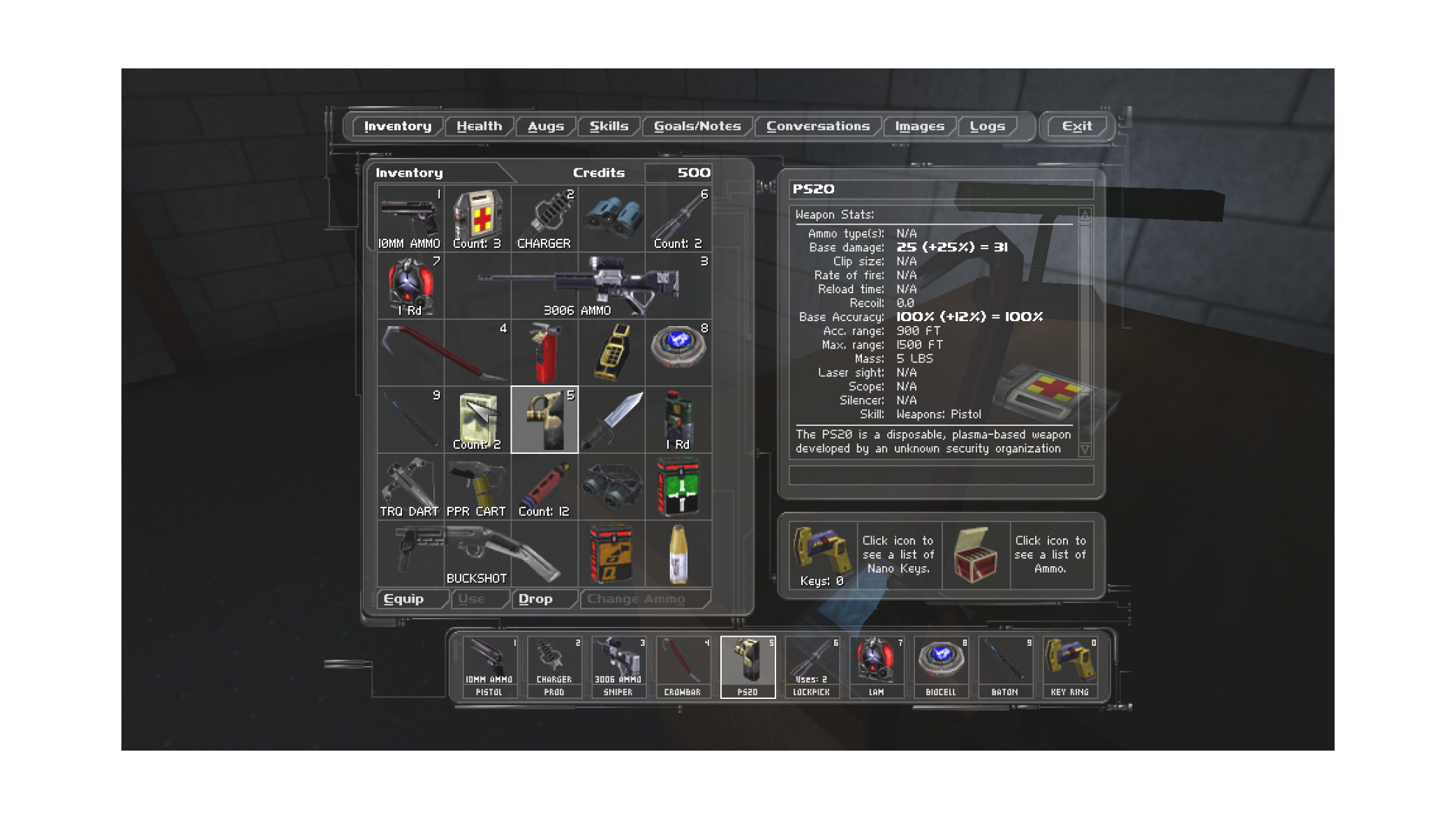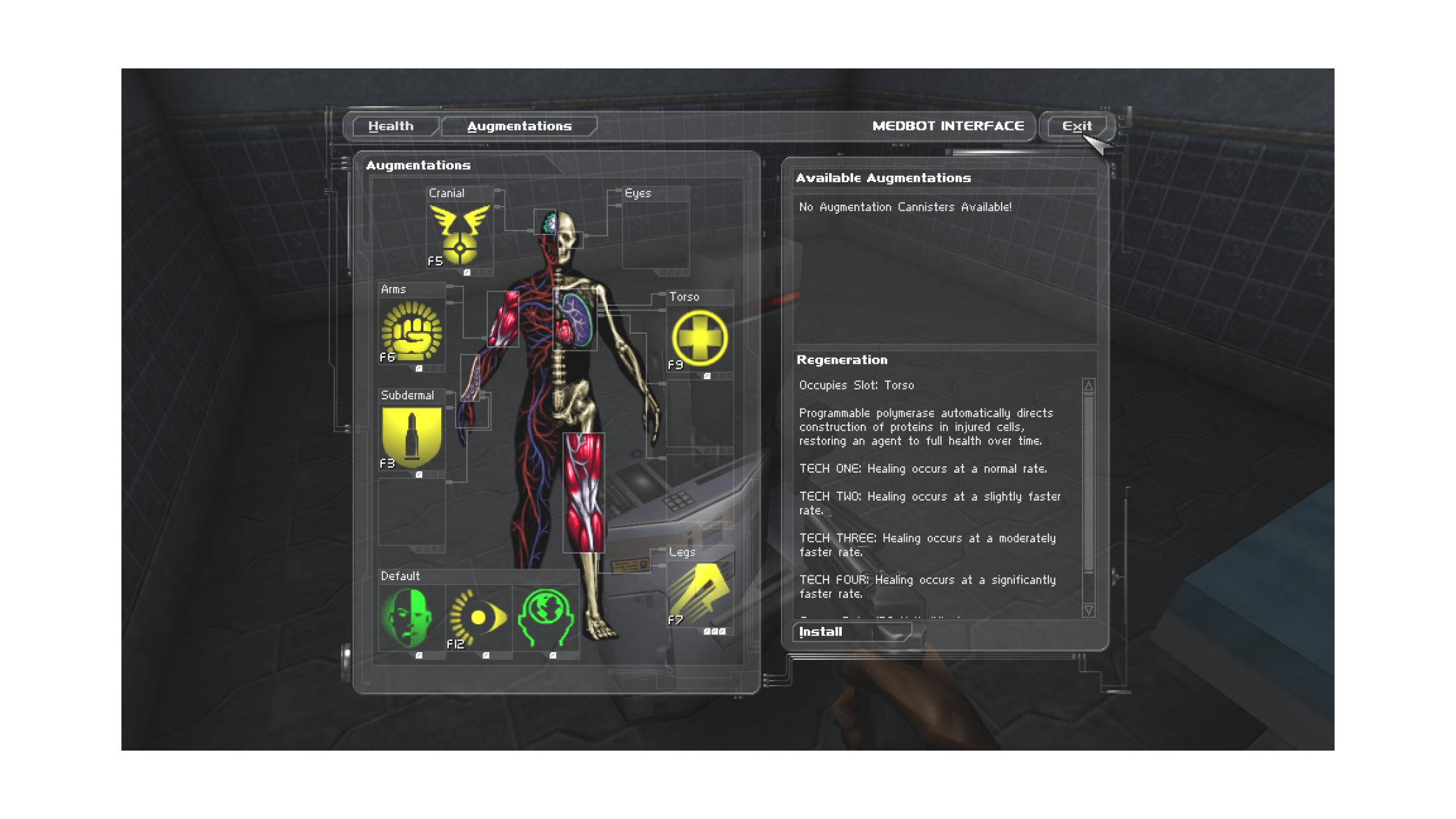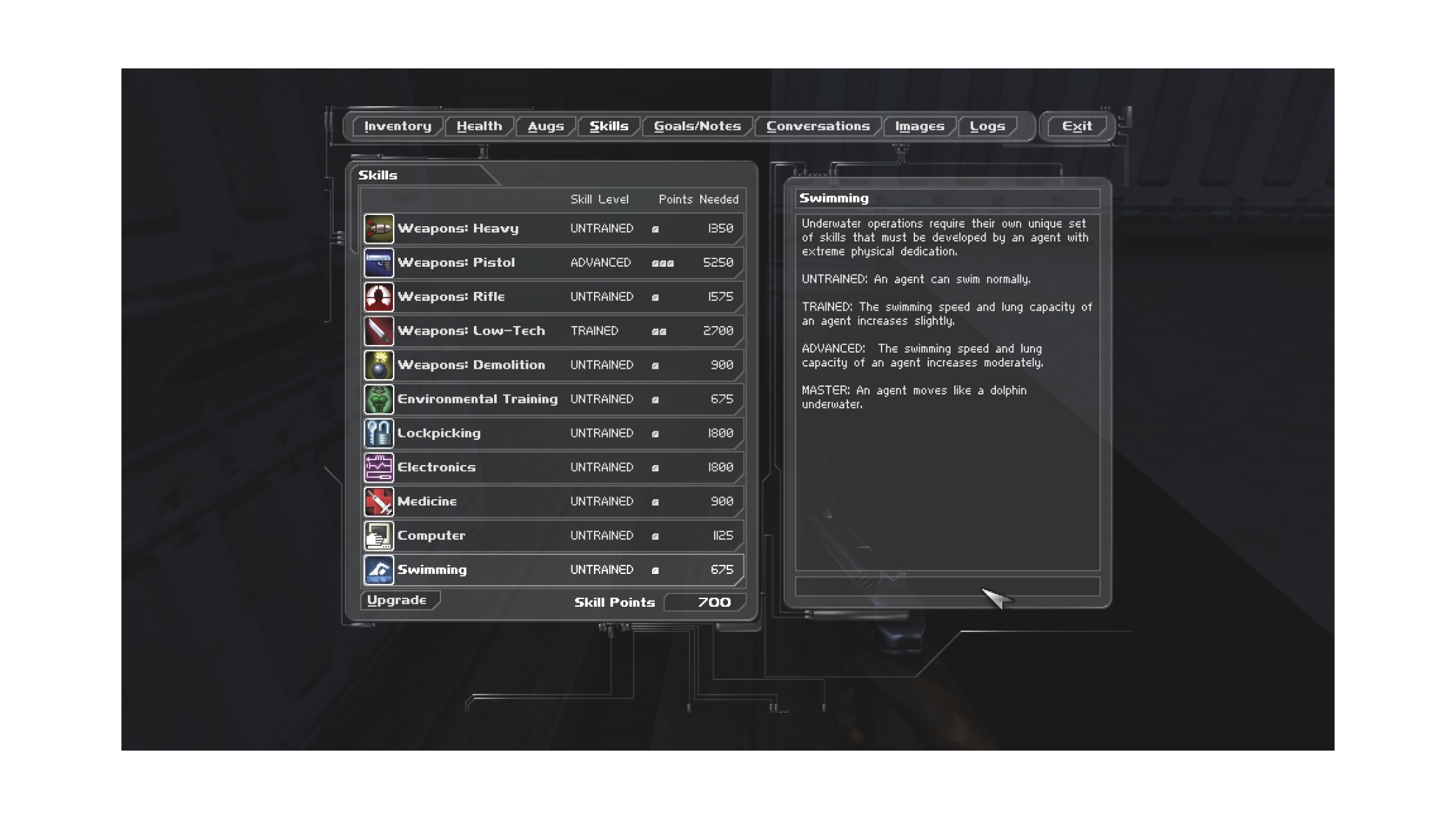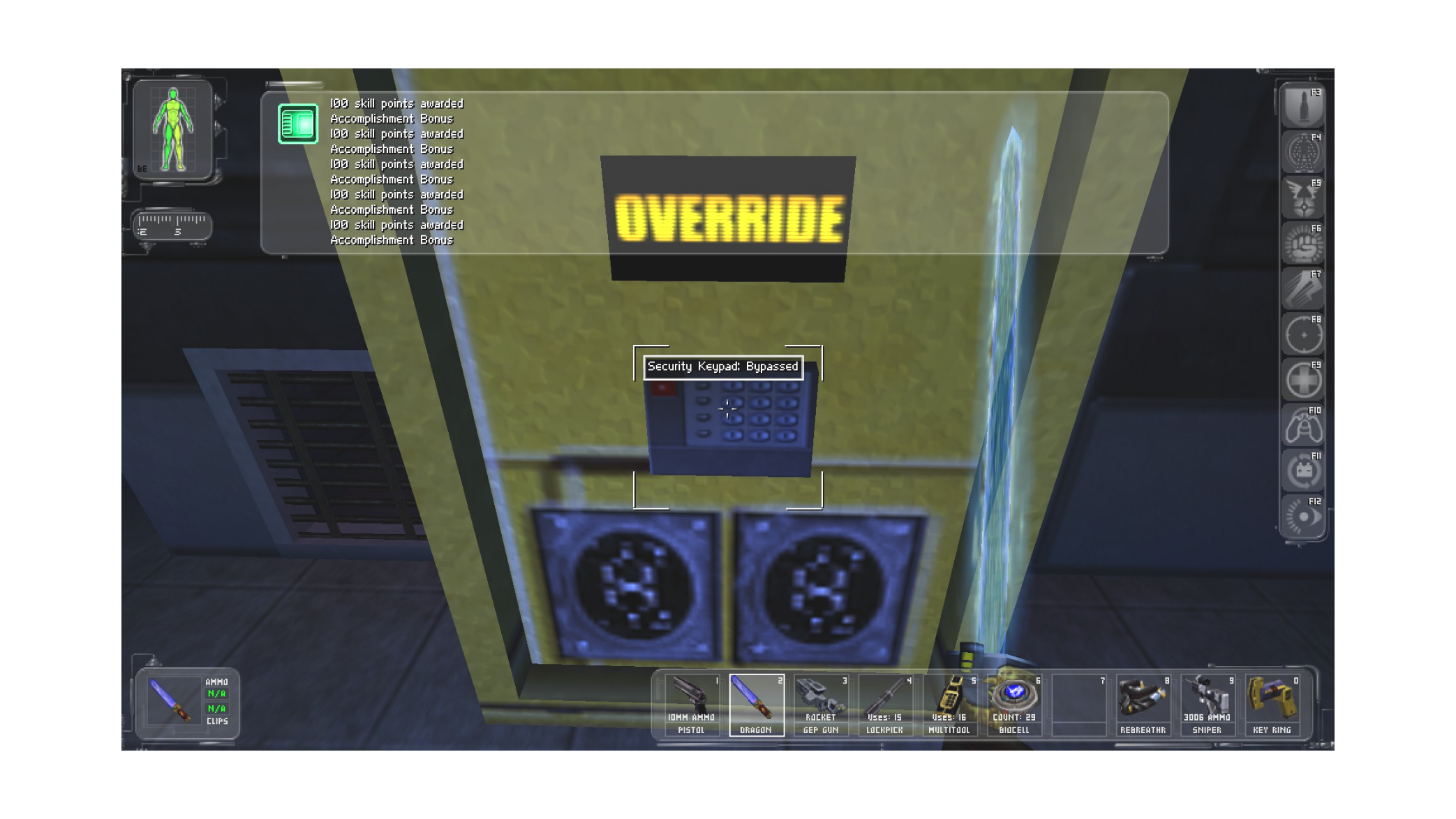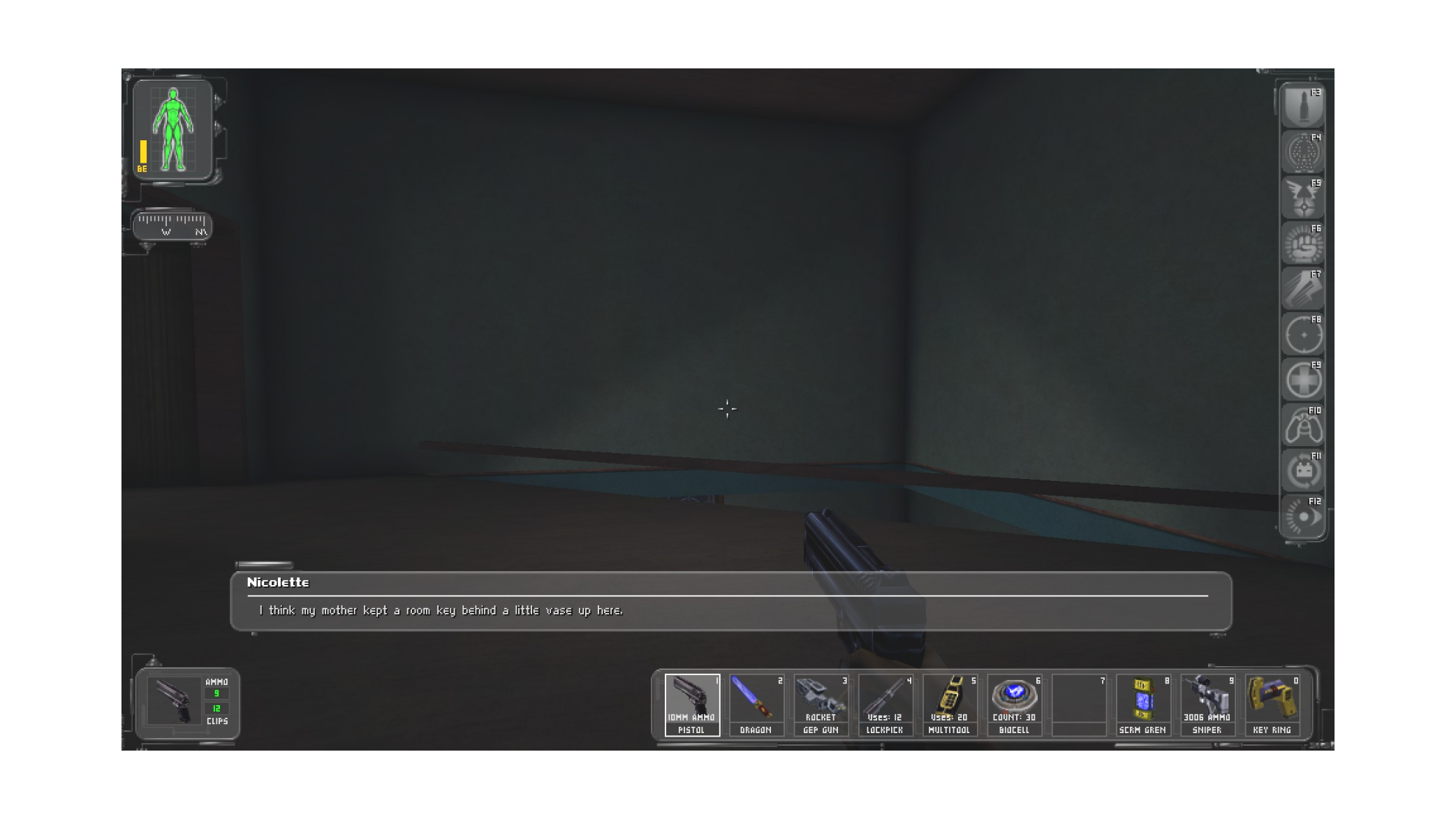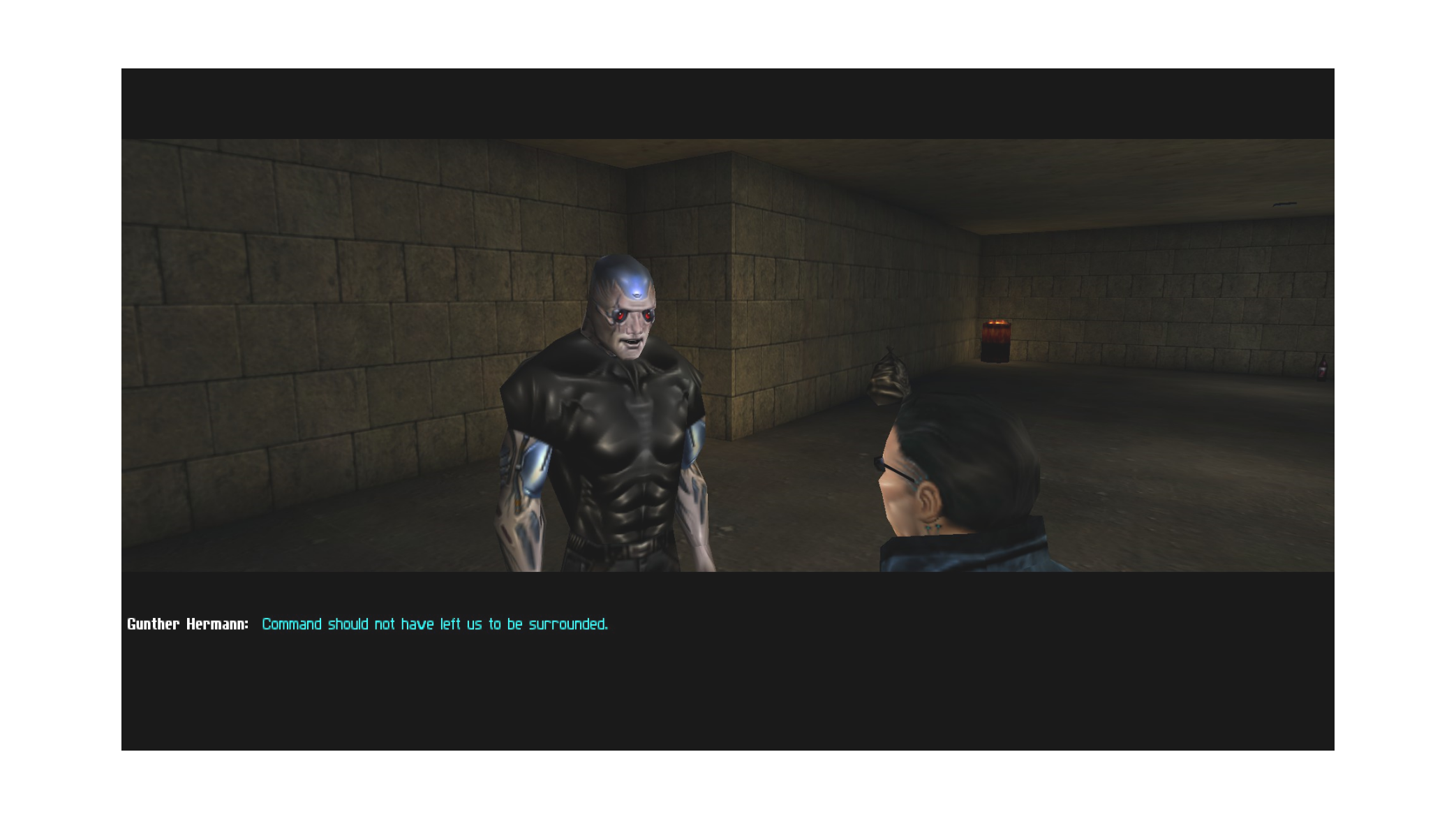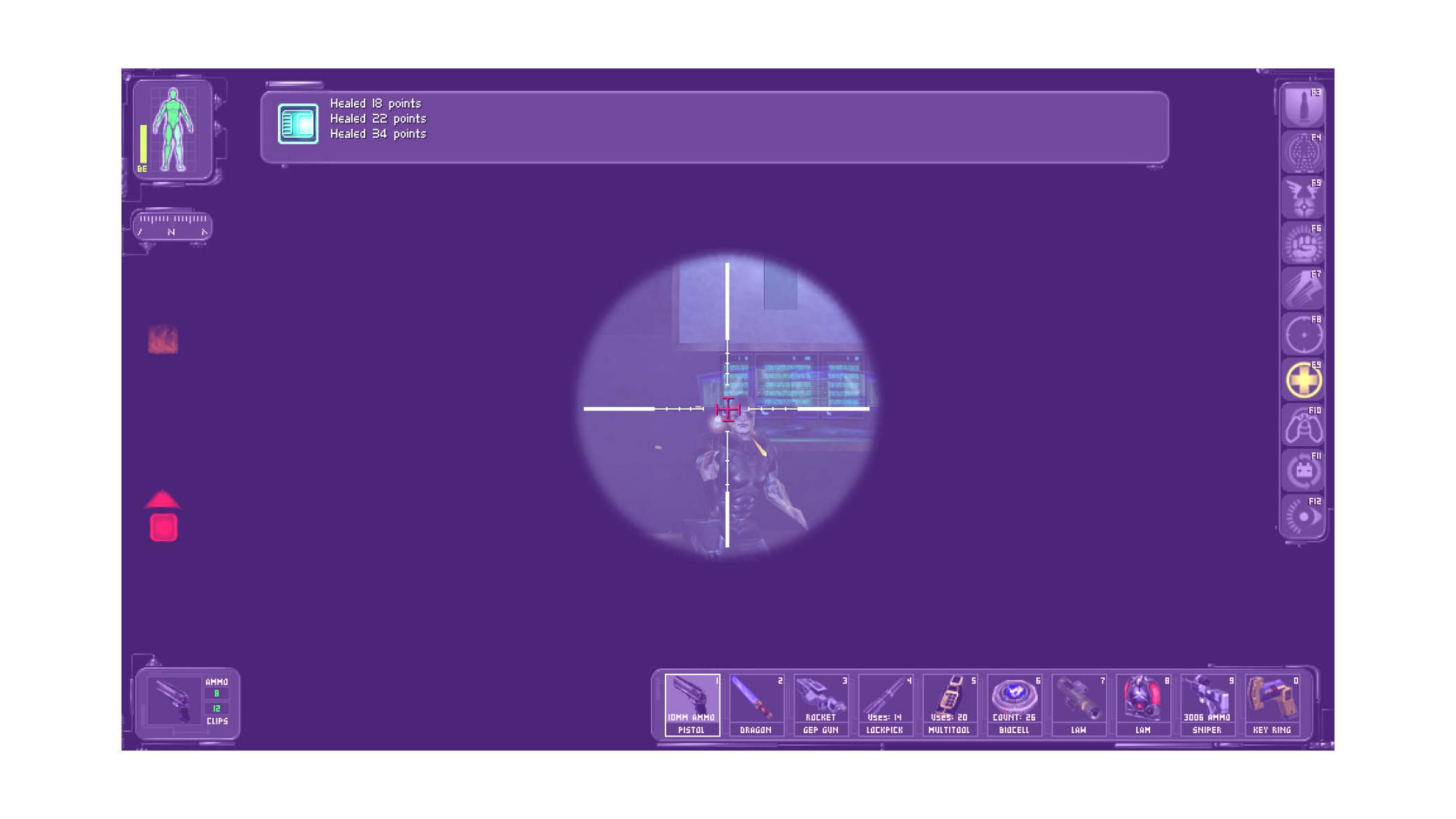Lepcis and I have been busy lately pretending to be adults, which has left our attention to PICD a bit scarce. Rest assured, our passion for gaming in all forms has never ebbed, it has merely had to be redirected in a few ways to better mold to our schedule. So what has ol’ Chezni been up to? Well, aside from repeatedly getting my Runner teeth kicked in by the NBN corporation controlled by Lepcis (click here if confused) I’ve been dumping my free time back into Deus Ex: Game of the Year Edition.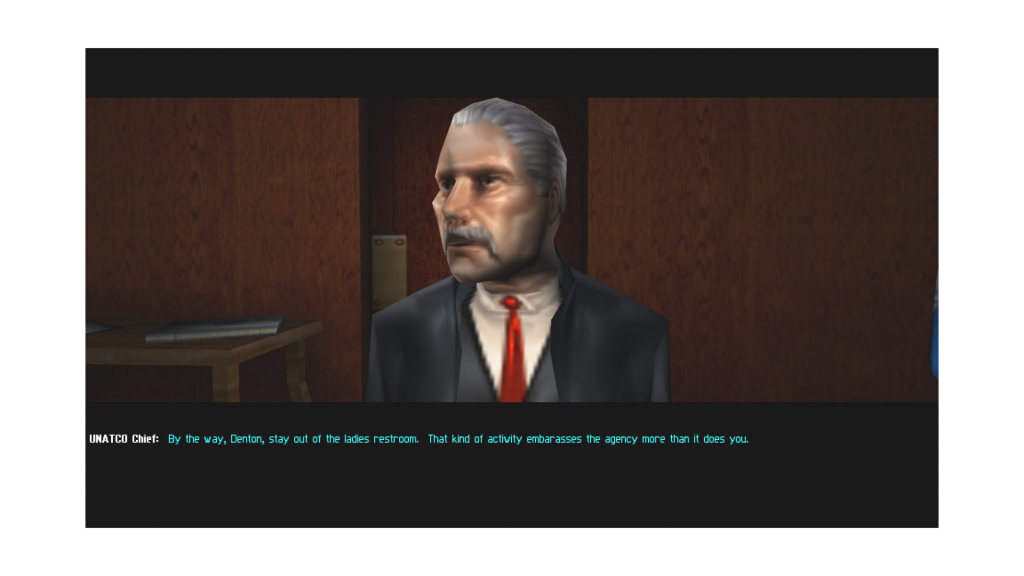 ***SPOILER ALERT***
***SPOILER ALERT***
As always, let’s start with the story.
Last we left off, JC Denton was fighting off random terrorists while working for a super-secrete-cyborg-symposium. Well, things get pretty deep after that but it quickly reveals a rather large problem with Deus Ex. First let me ask–is incredible depth in a story bad? No. Of course not. Is a complicated layered web of intrinsically linked stories that are ongoing and connected to the plot bad? Once again, no, that’s not bad. However, if a plot that contains the previous two features that is largely expositional through an incessantly inconsistent variant of talking voice boxes in your head, does that detract from its success? Yes. Likewise, if the same plot also never resolvs a large portion of these stories, never implicitly explained their meaning, or didn’t used nearly half of them to create meaningful impact on the plot, does that suppress the ultimate impact of them upon the player? Once again, yes. You see, there is a bantha-poodoo-ton of plots, characters, interactions, optional quests and (I regret to say) McGuffins that are scattered about the game that fall into these descriptions.
Ultimately, I felt like the story-writer knew how all these pieces fit together, he knew who all these characters were, what their lives were like, and why they were important to the story, but in the end as a player, I felt like I was desperately clinging to a paddle board with “MAIN PLOT HERE” spray-painted upon it whilst attempting to navigate through a sea of unimportant minor occurrences. As such, my main goal now is to try to relay to you what I considered the “important” bits of the story, whereupon later on I will try to piece together the remaining scraps of records into a useful format. If a Deus Ex die-hard fan ever reads this, please go easy on me, because chances are I’ve messed something up–if I’m honest I got really lost as to what was going on about half-way through the game.
MAIN PLOTS
Gray Death
The biggest and most stable plot throughout the game is that the world is being plagued by an incurable disease called “The Gray Death.” The early stages of the game present this to be some sort of disaster plague that quickly kills those it infects. While its role is not directly integral to the end-game scenario, it drives most of JC’s actions in the early part of the game and carries through at least subtly into the later parts. Eventually JC learns that the Gray Death is not a natural born virus, but a disease inflicted by microscopic nanites that destroy the organism’s body from within. At first it seems like UNATCO (United Nations Anti-Terrorist Coalition), the agency that JC works for, is desperately trying to research a cure for the virus, but later it is revealed (around the same time when it is revealed that UNATCO is actually a subsidiary of MJ12, which we’ll get to in a bit) that UNATCO created the virus and are purposefully withholding the cure in order to make money… or control the population… or something. This is about where this plot kind of fizzles out, and unless you take one of the three specific endings of the game, a conclusive action in solving it doesn’t even get mentioned. JC is never infected by the virus (and probably never can be since his body has been designed to interface with nanites in the first place) and of the few important characters infected by it, you acquire a cure for them rather effortlessly.
Paul Denton/NSF
JC has an older brother named Paul, who works for UNATCO and gives you much of your mission info early on. Within about the first 20% of the game though, he defects to the NSF (National Secessionist Forces), who are the terrorists you were fighting at the beginning of the game. Upon confronting him, Paul lets JC know that UNATCO is actually a member of MJ12 (I promise I will explain in a bit, MJ12 is next) and that their actions don’t help the common people. JC will eventually join up with the NSF and aid them in their efforts through various McGuffins like involving himself in gang power struggles and… meeting up with some dead woman’s daughter to do… something? I was really lost at that point of the game. The only thing I even remember about that section of the game is her telling JC how she lost her virginity in some garden… thanks? The whole NSF plot is a huge McGuffin that really extends the length of the game from about the 30% to the 80% portion of the game and fizzles out by the end as well. Once again, nothing is officially concluded, and a lot of it happens off-camera through talking heads. Arguably, choosing the Tracer Tong ending is sort of the NSF ending, but they aren’t even mentioned as an organization in it.
MJ12/Illuminati
A little more than half-way through the game, it’s revealed that MJ12 is actually the Illuminati. Yeah, you heard me–the Illuminati. To be fair, this was before the big Illuminati craze that happened around the turn of 2010 among America’s youth, so it’s quite possible that back in 2000 when this was released this idea was still fresh and not a topic to bring up when discussing troll conspiracies. It’s never deeply explained what their motivation is, but it’s something along the lines of shaping the world to where it needs to be in order to allow the general populace to see the “Truth” (whatever that is). It’s implied that the Illuminati have been secretly pulling the strings of all the major organizations around the world and that the UN (United Nations) has been in their pocket since its inception. As mentioned before, they introduced the Gray Death so that they could kill of those that they did not deem worthy of a vaccine, and they seem to have an agenda for pushing nanite-infused humans as being the next step of human evolution. Near the end JC joins(?) the Illumanti (old blood?) but at this point of the plot I wasn’t “kind of lost,” I was hella lost, so you’ll have to wiki that one.
Daedalus/Icarus/Helios
Friends, I apologize because I’m going to try my best, but I know that there is no way I’m going to be able to accurately recount this one. Once JC realized that UNATCO is corrupt and gets captured, an AI called Daedalus contacts and frees him. I think Daedalus was created by UNATCO/MJ12 to identify and neutralize terrorist groups, but it then identified UNATCO/MJ12 as a terrorist group and began acting on its own to bring its creators down. Along the way another AI starts talking in your head with a super-creepy voice… and I think it was called Icarus? Icarus was created to “solve the Daedalus problem,” but even that isn’t explained in great detail. Eventually, Daedalus and Icarus merge into one AI who view humans as unable to properly govern themselves, and asks to merge with JC and rule the world, creating one of the three endings.
MINOR PLOTS
Statue of Liberty Gets Bombed
Yeah, that’s about it. I think the NSF did it. We don’t ever find out if they fix it, or what the populace thinks of that.
Paul’s Death
Paul dies but there’s not a lot of detail surrounding it. You see his body, but JC barely mourns. It’s weird because not much comes from it, other than JC’s need to pick up with the NSF where Paul left off.
Nicollette
She looks cool. She’s French. She would probably kick ass if she ever picked up a gun. Don’t worry though, she’s introduced as quickly as she disappears. Ultimately a very pointless contact for the NSF who seems like she was supposed to play a much larger role, but was cut due to time/budget reasons.
JC’s Killswitch
JC has a killswitch that gets flipped when he betrays the organization. MJ12 was nice enough (or stupid enough) to give JC 24 hours after it is switched to find a cure. Of course, JC finds a cure.
Lucius DeBeers
You’re going to love this one. Behind a hidden optional door in the Illuminati base, there is a frozen conscious man you can talk to called “Lucius DeBeers” who apparently is the (original?) leader of the Illumanti. He’s introduced, he’s pointless, and serves no plot importance whatsoever. Very similar to Nicollette, he feels like he was originally supposed to be part of a portion of the story we never got.
Walton Simons
Makes vague threats at you throughout the entire game and dies in a 10 second “boss” fight. Apparently he as the leader of MJ12 or something. Darth Sidious in episode 5 commanded a more impressionable performance.
Grays, Greasels & Karkians
MJ12 (being that they run Area 51) have Grays. You know, Grays? Aliens. With big heads and big eyes. They also have bio-genetically engineered creatures named Greasels (winged lizards?) and Karkians (Giant armored salamanders). Aside from the fact that they provide a different enemy for you to fight and that they indicate that MJ12 has a love for putting bizarre creatures behind cages, they really aren’t that important.
Silhouettes, Triads & The Dragon Sword
Gangs… that are important for some reason. Involved with the NSF but largely a McGuffin, they were mostly used to introduce the Dragon Sword. The Dragon Sword’s plot also fizzles and no one mentions the weapon after the brief stint when you steal it and send a copy of its blueprints to Tong.
Gunther & Navarre
JC is actually the upgraded version of MJ12’s experiments. Their prior experiments created people who had large portions of their bodies removed and replaced by mechanic augmentations, and they are therefore referred to as Mechs (although cyborg comes to mind…). Eventually JC kills Navarre and Gunther hunts him down, inevitably falling to JC as well. I found a killcode (a phrase that when spoken will kill a mech) for Gunther, but I wasn’t able to figure out how to actually say it in front of him. I probably missed something.
AI Morpheus
Uh… yeah, did I mention that there was a fourth AI? This one spends its life on the internet and watches you when you’re asleep or in the shower. Thaaat’s about it. Not sure why this one was even in here.
Bob Page
There were so many characters introduced at this point of the game that would pop up, say a few lines, give you a mission and then die or disappear for the rest of the game that I stopped paying attention to any of them, so when “Bob Page,” decided that he was going to fuse himself with nanites and become one with Helios, I just laughed. I laughed partially because I had no idea who he was, or why he was important, but I also laughed because there was no way anyone would ever recognize their “Great AI Fused Overlord, Bob.” At any rate, all the endings involved thwarting his efforts, either by destroying him by deactivating fusion cores that are powering his conversion into pure energy (or something) or by fusing with Helios first.
ENDING PLOTS
Chaos Ending
Siding with Tracer Tong, the most annoying man who talks in your head that ever existed, you destroy the main data center for MJ12 aka the Illuminati, permanently destroying all current forms of digital information and severing all connections that peoples have across the world. It is described akin to sending mankind back to the Dark Ages where city-states would rule.
20th Century Ending
Siding with some guy called Morgan Everett (once again, stopped caring about characters when they started appearing and disappearing at an alarming rate) you destroy Bob Page and Helios but keep the Illuminati intact. JC and Morgan work to establish a world governed identical to our world’s year 2000, complete with taxes, capitalism and democracy. JC and Morgan agree that the world is “not ready” for the Truth, but one day they shall lead them to the light.
AI GOD-MODE ENDING
Clearly the best ending, JC realizes that it was allways his destiny to fuse with Helios and become the benevolent ruler of mankind. Willingly following Helios’s orders, he fuses with the AI to gain unlimited power and intelligence. The scene ends with JC talking about there being much that needs to be done in order to set mankind right.
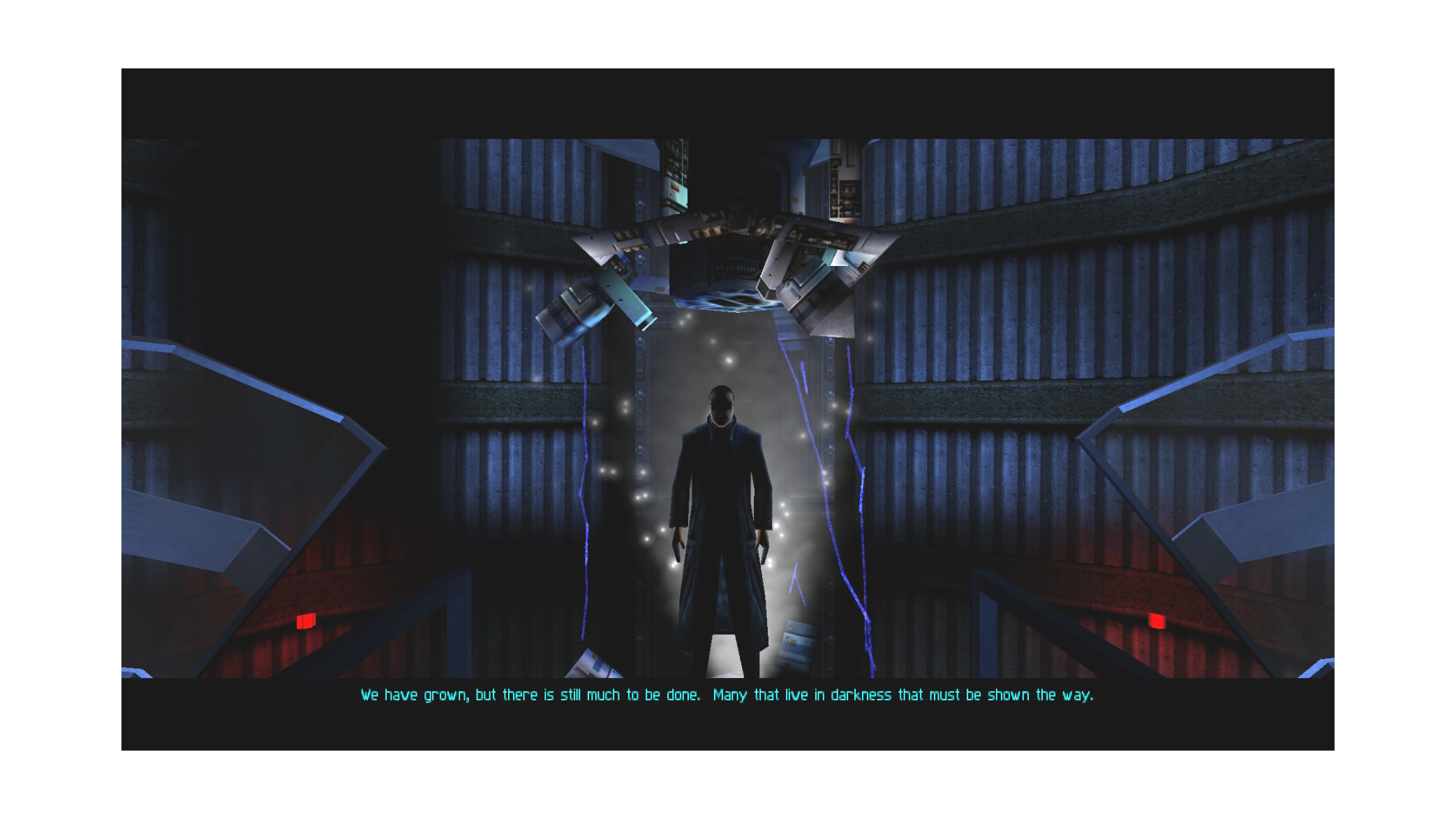
I probably missed quite a few minor plots in the prior list, but do you see how complicated this is? What makes it worse is that it’s all being thrown at you a piece at a time all at once. That’s really the bigger problem. Taking them all out and looking at them in a bite-sized manner, there are some interesting things that are going in in Deus Ex’s plot. The biggest problem is that a lot of them either fizzle out or are never even attempted at being concluded in the first place. Deus Ex goes from a story about fighting against a deadly disease to a story about overthrowing the government, to a story about the Illuminati, to a story about ruling the world. There are a lot of jumps to make and not always are they fluid or clear. That being said, it’s not terrible–I just wish it had been developed better, or that it had moved in a way that allowed us as a player to explore the parts we were interested in so that we could isolate the stories we wanted to know and quiet the noise of the things we weren’t ready for (additionally this would add replay value). Even though the game seems like there should be multiple paths to take, the entire game is linear up to the very end where you get one of the three endings which is disappointing. Kudos on them for not giving a “good/bad” ending choice though. None of the choices are good or bad–merely choices.
MECHANICS/GAMEPLAY
The best part of the actual “playing” segments of Deus Ex come from its level design. The design isn’t perfect and sometimes borderlines “messy,” but there are never less than two ways to get somewhere in the level. Let’s simply take the visual sight of one instance of infrared security lasers that you might come across within a level. Here are the common ways you might approach something like this.
- Walk through the lasers. Take whatever consequences may come.
- Blow up the lasers. GEP rocket, LAM grenade, or LAW rocket.
- Diffuse the lasers. Use EMP or something similar to temporarily disrupt the lasers.
- Stack up some boxes and jump over the lasers. Just hope that there’s enough roof space.
- Use super-speed to leap over them. Also need enough roof space.
- Read all newspapers, books, and palm-pilots that were lying around. Discover the username and password for the security computers. Login to the security computers. Disarm the lasers. Plot-junky’s favorite choice.
- Use a max-level Security skill to break the ICE on the security computer and disarm the lasers within a time-limit.
- Blow up the turret/robot before you trigger the lasers.
- Hack the turret/robot before you trigger the laser (if it’s in reach).
- Use radar diffusion to make yourself invisible to robots.
- Find a different way around. Chances are there are 1-3 other paths to get to the room that the lasers are blocking. You might have to break a window or push a secret button to get there, but there’s always another way.
So there you have it, and I’m not even joking. These are the normal approaches to a very common in-game obstacle, and you’re allowed to solve it in no less than 11 different ways, any of which are equally viable, assuming that they are available as a choice. There are tons of other obstacles to surpass as well. Locked doors. Scanning cameras. Locked computers. Locked chests/cabinets. Patrolling guards. Patrolling robots. Items that need stolen. Data that needs stolen. Deus Ex provides so many different options for solving problems that it’s almost criminal–it’s almost to a fault. I can’t believe I’m saying this, but by the end of the game, I was actually getting sick of it. I was never worried if I ran into a locked door that I didn’t have a key for because I knew that there were 3 other ways to get inside. I didn’t care that I wasn’t paying attention to security codes or passwords that were left as clues lying around, because I knew I could hack, picklock or multi-tool myself into places that I shouldn’t be. I wasn’t worried if I killed any NPC that looked at me funny who might have provided me with plot-critical information because I knew that later on I could find that information in a different form–or even better yet, I didn’t need to know it to complete the level at all. Deus Ex is almost too good at giving the players options, to the point where I felt no tension in my ability to beat the level.
Combat in the game ended at above-average around a B, B-. The first half of the game was great. I was spending my skillpoints in places where I thought I would need them. (For those interested, I Mastered handguns with sub-specializations in primitive weapons, lockpicks and multi-tools.) I was hungrily searching for new and better weapons, and every weapons mod upgrade I could find felt like winning the lottery. Let’s not forget the augmentation skills either–get good at using the F# keys, because you’ll need them. By the end of the game, F3-F12 will each hold a useful skill that turns you into a super-fighting nanite machine. I should also point out that those skills aren’t linear either–there are 18 skills in the game, but you can only choose 9 of them; one of two for each F# key.
It’s clear that the developers wanted you to feel strong by the end of the game–and they delivered pretty well. The problem is that the enemies that you are fighting at the beginning of the game comprise the majority of the enemies that you are fighting at the end of the game. At no point does the Deus Ex really throw stronger enemies into the game to challenge you. Sure, there are agents, but they fight just like the soldiers with the exception that they explode when they die. There’s also the MJ12 Troopers that have more HP and might shoot rockets, but just like any other enemy, one good strike with the Dragon Sword from behind and they’ll die just like any other. All mechs are generally approached the same way as well–GEP rockets are mostly the only reliable way to pierce armor and it comes with a homing device which means all mechs are dispatched by training the cursor on them for a few seconds and then firing away. Greasels, Grays and Karkians appear so infrequently that they don’t really count as variant enemy types, but even if they did they die just as easily and quickly as the previous enemies.
The ultimate problem is that at Deus Ex’s start, the difficulty and avatar strength progression is great. By the half-way point though, you’ve already encountered the game’s strongest enemies, and likely you were able to easily dispatch them, which means that combat is less a meaningful challenge for the second half of the game, and more rinsing and repeating the same old motions you’ve already learned since the game’s beginning. Sadly, this made the thrill of exploration take a big dip, since there was no need to discover weapon upgrades or ammunition. The Dragon Sword also was a big question mark. The weapon deals 100 damage per swing. To give you some perspective, the next best melee weapon (the sword) deals 9. I understand that they wanted to give melee fighters some kind of advantage, but this advantage is just far too great. That being said, the extremely open level design coupled with complete freedom in weapon choice and tactics did a lot to conceal the lackluster enemy design, and while it wasn’t a stellar performance, gameplay overall could be described again as as above average.
GLITCHES/BURNOUT
I don’t want to spend a lot of time on this one, but the game is so open that it’s easy to break it onn a few fronts, especially if you take super speed which grants you the ability to hop around and access large portions of levels before you were naturally intended. Minor errors (and probably the most common) are voice clips that get triggered completely out of order. Sometimes characters will talk to you as if they’ve already given you a series of orders, only for you to find out later that you didn’t trigger the initial order-giving dialogue by traveling through a specific doorway, whereupon you enter said doorway after finishing the level. Another error involves doors that might open when they aren’t supposed to (such as enemies that travel through them because you grabbed their attention through a wall) or doors that you need to travel through that get stuck because of where you were standing. A healthy supply of saves and quicksaves will stave off most of this though. A third error is the quest log not registering when quests were completed. While it never made an impact on the game, it was funny that I carried the “Get the Dragon Sword for Tracer Tong” quest throughout the entire game, along with a few others. Last, and certainly the most game-breaking was an infinite EXP bug I discovered around the 80% point of the game. By accessing a previously hacked terminal and closing out of it, the game rewarded me with 100 skill points for completing my objective. The code either lacked a variable to cease the EXP reward or I had bypassed it somehow–but regardless, I was able to rack up thousands of skill points in just a few minutes, allowing myself to purchase most of the upgrades that I wanted to play around with. I didn’t feel *too* bad, since the perks they gave were not ones I needed to complete the game, but it was fun to mess around with being able to swim faster or hack computer terminals.
These and other kinds of glitches seemed to increase a lot as the game progressed. Additionally, the levels started to feel less-designed or blank. I remember walking into a condo building where aside from a few couches and plants, the entire building was bare. I even had a good laugh at a single-texture boxy-sort of structure that held a pot and frying pan. I can only assume that it was supposed to be a stove. I got the impression that by the end of the game, the devs lost a lot of their steam. Luckily, the very last portion (where you get to pick your ending) kicked it back up to the game’s previous quality. The 50%-90% portion of the game had segments that felt pretty soulless though.
DEATH OR MERCY?
There’s this odd distinction in the game between death and incapacitation. Very early on, it’s clear that you can get rid of an opponent in two ways–kill them or knock them out. For about the first 30% of the game, characters are designed to recognize your choice in the matter as well. Paul Denton will become upset with you if you kill terrorists instead of incapacitating them, and several soldiers will make comments based upon the number of bodies you left for them to clean up. Agent Navarre will even glow with pride if you prefer killing instead of sparing. What’s even weirder is that this is not some minor mechanic of the game–information is presented to the player to inform them of the lethality of their attacks. Dart bows are filled with non-lethal sleeping gas. Batons will knock people out but not kill them. Gas grenades are filled with knockout gas. A body that is killed will say the NPC’s name and “Dead,” whereas a knocked out enemy will be listed as “Unconscious.” In spite of all this pomp and circumstance concerning whether you’ve taken a life or spared it, it has no meaningful affect on the game whatsoever. It doesn’t change your ending, it doesn’t change your story, JC’s lines, actions and mannerisms don’t change. Essentially, as it exists, doing a “mercy run” of Deus Ex is just something that fans of the game do to give themselves a challenge. Otherwise, it means nothing.
I ran the game on full bloodbath mode. I probably killed 9 out of every 10 NPCs I encountered. It confused me greatly when JC spoke cool, calm and collected on multiple occasions about what was good for the people in cinematics. If they had implemented a diversion of the story based on these actions, I think the game would have been timeless. As it stands now, it’s still a good game, but just lacks a hugely missed opportunity.
CONCLUSION
Deus Ex is still a Tier 1 game in my opinion. If I had more time, I don’t think I’d mind giving it another playthrough and maybe focusing on a different set of skills. Doing a mercy run has some real appeal, even if the game doesn’t change anything based upon it. That being said, I never found the game to be “addictive,” merely “wholesome.” What I mean is that there was no addictive mechanic that I kept wanting to return to in order to get more of. I wasn’t returning so I could shoot up more bad guys and get EXP. I wasn’t returning so I could hack more computers and steal money. At no point was “power fantasy” the main appeal for the game (or even a main appeal). No, the reason I kept returning was to see where the plot went, to discover more clever multiple-paths to solving problems and because I genuinely liked JC Denton. I certainly understand how and why this game has influenced so many others since its release (as I already alluded, E.Y.E. makes so much more sense now). I don’t know if it was my favorite game ever, but deserves its place as an anchor point in gaming history, with aspects that more modern games should aspire to imitate.
